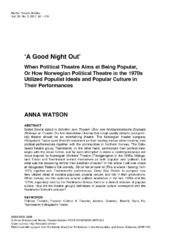A Good Night Out’: When Political Theatre Aims at Being Popular, Or How Norwegian Political Theatre in the 1970s Utilized Populist Ideals and Popular Culture in Their Performances
Peer reviewed, Journal article
Published version

Åpne
Permanent lenke
https://hdl.handle.net/1956/19289Utgivelsesdato
2018-03-05Metadata
Vis full innførselSamlinger
Originalversjon
https://doi.org/10.7146/nts.v29i2.104615Sammendrag
Bertolt Brecht stated in Schriften zum Theater: Über eine Nichtaristotelische Dramatik (Writings on Theatre: On Anti-Aristotelian Drama) that a high quality didactic (and political) theatre should be an entertaining theatre. The Norwegian theatre company Hålogaland Teater used Brecht’s statement as their leading motive when creating their political performances together with the communities in Northern Norway. The Oslo-based theatre group, Tramteatret, on the other hand, synthesised their political messages with the revue format, and by such attempted to make a contemporaneous red revue inspired by Norwegian Workers’ Theatre (Tramgjengere) in the 1930s. Hålogaland Teater and Tramteatret termed themselves as both ‘popular’ and ‘political’, but what was the reasoning behind their aesthetic choices? In this article I will look closer at Hålogaland Teater’s folk comedy, Det er her æ høre tel (This is where I belong) from 1973, together with Tramteatret’s performance, Deep Sea Thriller, to compare how they utilized ideas of socialist populism, popular culture, and folk in their productions. When looking into the polemics around political aesthetics in the late 1960s and the 1970s, especially lead by the Frankfurter School, there is a distinct criticism of popular culture. How did the theatre group’s definitions of popular culture correspond with the Frankfurter School’s criticism?